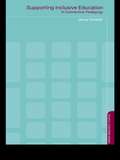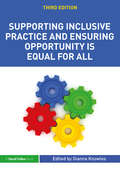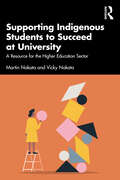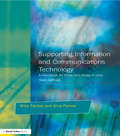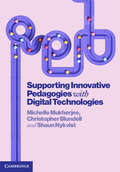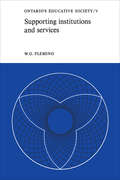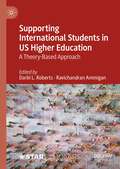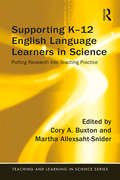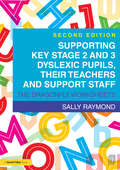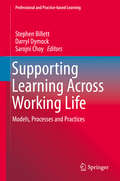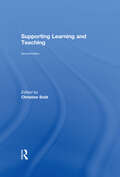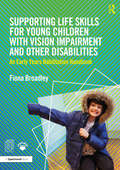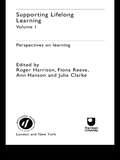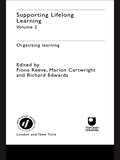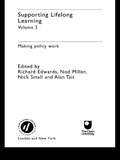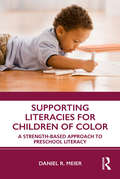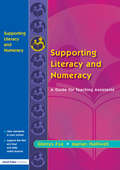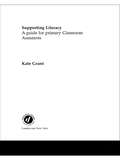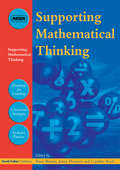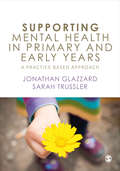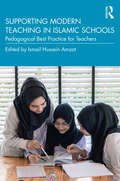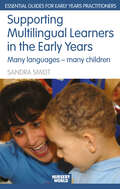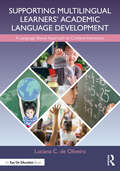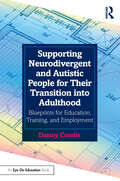- Table View
- List View
Supporting Inclusive Education
by Jenny CorbettSupporting Inclusive Education is a case study of a London primary school which includes a wide range of learners. It looks at: different teaching and learning styles; the effective use of learning support assistants; responding to challenging behaviour; using specialist strategies; how to research inclusive education; and what makes for a connective pedagogy. It is written for an audience of teacher-researchers in a jargon-free style.Jenny Corbett is a leading expert in the field of inclusive education; her experience in supporting individual learners in mainstream education and the way she links theory to practice make this an essential read for all involved in the area.
Supporting Inclusive Practice and Ensuring Opportunity is Equal for All
by Gianna KnowlesThis third edition of Supporting Inclusive Practice builds on the successful format of the previous two editions, both in content and structure. It explores many aspects of inclusive practice relevant to those who work with children in schools and other educational settings, aiming to provide the most up-to-date theoretical knowledge and understanding in the field, and illustrating the theory with examples of good practice in the areas explored. Many of the topics that have appeared in the previous editions, including supporting children for whom English is a second language, children on the autistic spectrum and children with neurodiversity conditions, also appear in this edition. The revised content of this third edition also covers recent and relevant changes in national policy and legislation, particularly, for example, around changes in equality and disability, same-sex parenting and transgender children and parenting policy and legislation. It explores the impact on aspects of inclusive practice legislation such as the Equality Act 2010, Marriage (Same Sex Couples) Act 2013 and the Children and Families Act 2014. It also explores in detail the revised 2014 SEN Code of Practice and the introduction of the pupil premium in 2011, which provides support for the education of children from low income families or who may be children who are fostered or in care. Throughout, the book is informed by the solution-focused social model of special educational needs and disability, and reflects current national policy that sees inclusive practice as fundamental to ensure equality of educational opportunity is achieved for all children.
Supporting Indigenous Students to Succeed at University: A Resource for the Higher Education Sector
by Martin Nakata Vicky NakataAddressing a significant gap in the literature, this book provides conceptual and practical foundations for the development of more effective support strategies to improve academic outcomes for Indigenous higher education students. Authors Martin and Vicky Nakata draw on Indigenous and higher education research, as well as their own experience implementing reforms to Indigenous student support services in Australian universities, to present a method that focuses on helping students to develop the skills and capabilities they need to thrive at university. The book is divided into three sections, the first outlining fifteen key concepts and conditions for student success. The second section provides detailed guidance on individual student case management, from foundational concepts through to implementation. The third section outlines what staff need to consider before attempting to implement changes to practice in their local context, offering a blueprint for assessing current practice, planning for and then implementing change. Presenting an approach that has proven successful in closing the gap between the academic outcomes of Indigenous and non-Indigenous students, this book is an essential resource for academic and non-academic staff who support underprepared students to succeed in higher education.
Supporting Information and Communications Technology: A Handbook for those who Assist in Early Years Settings
by Mike Farmer Gina FarmerFirst Published in 2001. This practical guide supports classroom assistants in the use of ICT. It provides support in the: practical issues linked to using a computer and other ICT equipment in the classroom; use of early years software linked to National Curriculum and Early Learning Goals outcomes; use of ICT in literacy, numeracy, science, art and design and children with special educational needs; personal use of ICT, linked to where it can contribute to classroom practice. It can be used as a stand-alone guide or in conjunction with study on classroom assistant training programmes.
Supporting Innovative Pedagogies with Digital Technologies
by Michelle Mukherjee Shaun Nykvist Christopher BlundellIncorporating digital technologies in the classroom can be both a daunting and exciting experience for educators of all age groups. Supporting Innovative Pedagogies with Digital Technologies explores intentional teaching approaches for using digital technologies in the classroom as a tool to support rather than replace established strategies. Readers will learn how to innovate their classroom, and vignettes from Early Childhood, Primary and Secondary classrooms will remove the overwhelming pressure of redesigning learning and teaching from scratch. Over three parts, the text explores understanding learning and teaching with digital technologies; designing and enacting learning with digital technologies; and professional responsibilities for teaching with digital technologies. Each chapter includes vignettes to illustrate key ideas and prompt discussion, reflection activities to encourage critical thinking and inspire educators to use key ideas in their practice, 'Tips and tricks' to provide practical hints and expert guidance for future consideration, and review questions to consolidate understanding.
Supporting Institutions and Services: Ontario's Educative Society, Volume V
by W. G. FlemingA variety of institutions and activities including the training of teachers, research and development, and educational television services are discussed in this volume. It describes in detail the creation and growth of the Ontario Institute for Studies in Education and its research activities, and gives an account of the educational activities of institutions such as the Royal Ontario Museum, the CBC, and the provincial libraries.
Supporting International Students in US Higher Education: A Theory-Based Approach
by Darbi L. Roberts Ravichandran AmmiganThis book explores the integral role that student affairs professionals play in the success of international students at higher education institutions in the US. International student support has often been thought of as the principal responsibility of international student services offices, but research suggests that international student engagement in the broader university community, and support for them by all student affairs and services offices on campus, is closely tied to persistence and retention. The authors explore a student development theory-based approach to supporting the experience and success of international students from all facets of student affairs and services. The book explores practical and strategic implications of a more integrative approach to international student support both inside and outside of the classroom, while also utilizing a critical lens in applying models that were originally built for predominantly white institutions and US citizens.
Supporting K-12 English Language Learners in Science: Putting Research into Teaching Practice (Teaching and Learning in Science Series)
by Cory Buxton Martha Allexsaht-SniderThe contribution of this book is to synthesize important common themes and highlight the unique features, findings, and lessons learned from three systematic, ongoing research and professional learning projects for supporting English learners in science. Each project, based in a different region of the U.S. and focused on different age ranges and target populations, actively grapples with the linguistic implications of the three-dimensional learning required by the Framework for K-12 Science Education and the Next Generation Science Standards. Each chapter provides research-based recommendations for improving the teaching of science to English learners. Offering insights into teacher professional learning as well as strategies for measuring and monitoring how well English learners are learning science and language, this book tells a compelling and inclusive story of the challenges and the opportunities of teaching science to English learners.
Supporting Key Stage 2 and 3 Dyslexic Pupils, their Teachers and Support Staff: The Dragonfly Worksheets
by Sally Raymond'I have found Sally Raymond's worksheets ideally suited for use with pupils in need of focussed literacy development materials. They find them varied and accessible with opportunities to include personal interests and topics. I use them to match specific learning needs to activities which introduce, explain, engage and assess individual targets and skills.' Julia Smith B.Ed. SpLD APC (Patoss) - dyslexia assessor and tutor This A4 resource book provides all the materials required to follow structured programmes of learning support for dyslexic pupils. Created by Sally Raymond, an experienced teacher of dyslexic pupils, this resource provides a wide variety of adaptable worksheets with lots of teaching advice and supportive guidance. The worksheets: are fully adaptable to meet the needs of different pupils support Department of Education recommendations and Ofsted advice and guidance encourage cross-curricula support and interventions to promote maximum access to a wide range of topics use varied, enjoyable, applications including games, quizzes and novel challenges designed to engage and stimulate thinking and learning develop the knowledge and skills of practitioners helping them identify and monitor progress and needs Also available by Sally Raymond: Extending Support for Key Stage 2 and 3 Dyslexic Pupils, their Teachers and Support Staff: The Dragonfly Games 978-1-13-877460-5 Spelling Rules, Riddles and Remedies 978-0-415-71000-8
Supporting Learning Across Working Life
by Stephen Billett Darryl Dymock Sarojni ChoyThis volume considers, rethinks and reorganizes how support for learning across working lifecan be best conceptualized, organized and enacted. It considers educational and learning support processes that include approaches thatfit well within working lives and workplaces, and support work and learning asa co-occurrence. These are the key focuses for individual and collectivecontributions to this edited volume, which provide discussions about whatconstitutes learning across working lives and how this differs from lifelonglearning and lifelong education. Accounts of learning across the working livesof social workers, doctors working in hospitals and in general practice,teaching, aviation, nursing, mining, aged care and more. These accounts advancea range of ways in which workers' learning across working lives is beingsupported and how this support is also linked to other changes, such as to theoccupational practice in which they engage.
Supporting Learning and Teaching
by Christine BoldSupporting Teaching and Learning brings together theoretical perspectives, practical educational ideas and current academic debates to help students develop their knowledge and understanding of core educational issues. It explores the professional relationships necessary for quality learning and encourages the reader to reflect critically on their values, beliefs and assumptions about learning and teaching. Written by an author team from a range of educational backgrounds, the book focuses on the key issues that teaching teams face as they work together to support children and young people in their learning. Covering a broad range of topics, themes and age ranges, each chapter contains a statement of the author’s values and beliefs and concludes with discussion starters, ideas for reflecting on practice and a list of useful resources. Chapters include: The core subjects in the curriculum; Information and Communications Technology, Linguistic and cultural diversity; Special educational needs; Out-of-school learning; Assessment; Reflective practice and action research. Accessible, discursive and thought provoking, this book is essential reading for students on a range of education courses including Foundation Degrees, Education Studies and those undertaking initial teacher training.
Supporting Life Skills for Young Children with Vision Impairment and Other Disabilities: An Early Years Habilitation Handbook
by Fiona BroadleyThis practical resource is designed to help professionals, parents and carers as they support children with vision impairments to develop independence in everyday tasks. Using the Early Years Foundation Stage framework as a basis, it provides a wealth of strategies and activities to develop key skills, including dressing, maintaining personal hygiene, eating and drinking and road safety. This is an invaluable tool that can be dipped in and out of to help make learning fun, boosting the child’s confi dence and helping create a positive ‘can- do’ attitude when faced with new challenges. This book: ◆ Addresses the main problem areas for babies and young visually impaired children and their families, by providing simple explanations of skills and offering strategies and techniques to support progression onto the next stage. ◆ Is written in a fully accessible style, with photocopiable pages and additional downloadable resources. ◆ Provides a variety of documentation to chart the child’s development and show progress over time. Research shows strong indicators that early intervention can reduce or eliminate developmental delays in children with a vision impairment. The supporting strategies in this book help busy professionals and carers to make every opportunity a learning opportunity, allowing children with a vision impairment to become confi dent and independent individuals.
Supporting Lifelong Learning: Volume I: Perspectives on Learning
by Roger Harrison Ann Hanson Julia Clarke Fiona Reeve<p>This Open University Reader examines the practices of learning and teaching which have been developed to support lifelong learning, and the understanding and assumptions which underpin them. The selection of texts trace the widening scope of academic understanding of learning and teaching, and considers the implications for those who develop programmes of learning. It examines in great depth those theories which have had the greatest impact in the field, theories of reflection and learning from experience and theories of situated learning. The implications of these theories are examined in relation to themes which run across the reader, namely, workplace learning, literacies, and the possibilities offered by information and communication technologies. <p>The particular focus of this Reader is on the psychological or cognitive phenomena that happen in the minds of individual learners. The readings have been selected to represent a range of experience in different sectors of education from around the globe.</p>
Supporting Lifelong Learning: Volume II: Organising Learning (Supporting Lifelong Learning Ser.)
by Richard Edwards Marion Cartwright Fiona ReeveThis Reader examines the ways in which learning is organized in a diverse range of lifelong learning environments. If we are to harness the full potential of this learning, the structures of organizations and providers will have to change.The book also examines the shift away from the perception of formal institutions as the sole providers of education and the increasing recognition of the learning opportunities which exist outside the walls of institutions. The book looks at what types of environment promote lifelong learning, how they can be organised to support meaningful learning and what the implications are for managers. Supporting Lifelong Learning Volume II: Organising Learning also looks at the implications of wider concepts of the learning city, learning region and the learning society in a fresh and accessible text with a uniquely international dimension.
Supporting Lifelong Learning: Volume III: Making Policy Work
by Richard Edwards Alan Tait Nod Miller Nick Small<p>This volume of the Open University Reader for Supporting Lifelong Learning looks at policy development in lifelong learning at local, regional, national and supra-national levels. Using an international team of contributors, it explores and examines the policy context for lifelong learning, the policies themselves, and their effects when implemented. <p>The book focuses on the role of lifelong learning policy in relation to issues of competitiveness, technological change and social inclusion. The provision of a range of chapters from around the globe uniquely establishes a comparative basis for the reader. This volume also encourages the student to evaluate lifelong learning as a response to globalising trends and the globalising of educational policy.</p>
Supporting Literacies for Children of Color: A Strength-Based Approach to Preschool Literacy
by Daniel R. MeierA comprehensive theory-to-practice guidebook, Supporting Literacies for Children of Color argues for a new strength-based view of teaching to support the literacy talents and abilities of preschool-aged children of Color. The early childhood field is at a critical juncture in preschool literacy education as educators confront an ever-changing array of curricular approaches and assessment measures while still trying to meet the social, cultural, language, and literacy needs of individual children. By integrating parent and teacher literacy perspectives, as well as calling on the author’s own decades of teaching, this book offers practical tools and strategies for culturally responsive pedagogy and demonstrates effective methods for using oral language and multilingualism to celebrate and deepen the literacy capabilities of children of Color. Featuring examples of children’s literacy processes and products both at home and in preschools to illustrate effective instructional strategies, as well as boxes noting important ideas and strategies in each major section, this text will guide students and educators toward creating a supportive learning environment for children of Color.
Supporting Literacy and Numeracy: A Guide for Learning Support Assistants
by Glenys Fox Marian HalliwellA practical guide to the ways in which the Learning Support Assistant can effectively support the class teacher with regard to literacy and numeracy frameworks.
Supporting Literacy: A Guide for Primary Classroom Assistants
by Kate GrantClassroom assistants are increasingly relied upon to support the most needy pupils, and they have had significantly less training than their colleagues with qualified teacher status. It is clear that these assistants need some very practical materials. This book provides photocopiable resources so that classroom assistants can get to work.The book covers all they need to know about literacy, it explains in very simple terms what is expected from them and:*how the National Literacy Strategy works*how to support reading, writing and spelling*how to select fiction and non-fiction*how to help children use computersIt also covers issues such as:*how to help children for whom English is not their first language*how to help children with special needs*how to set targets and monitor progress.As well as providing an invaluable manual for assistants, Supporting Literacy will be useful for SENCOs and English Co-ordinators who are training support staff and volunteers in primary schools. Learning Support Assistants and others following recognised courses (eg Specialist Teacher's Assistants) will find the book helpful in the study of children's literacy.
Supporting Mathematical Thinking (nasen spotlight)
by Anne Watson Caroline Roaf Jenny HoussartTo what extent do curriculum subjects, particularly highly abstract ones such as Mathematics, have their own unique special needs? This book celebrates the work done by subject specialists in mainstream classrooms to promote inclusive practice. It describes new and creative ways of developing mathematical thinking among pupils. Each chapter demonstrates reflective minds at work, close observation of learners, willingness to understand the students’ thinking process and patient commitment to students over long periods of time. Features of the book include: how low-attaining students can think mathematically numeracy recovery task refusal in primary mathematics progression in written calculation strategies for division using graphic calculators with low-attaining pupils generalising arithmetic: an alternative to algebra learning support assistants in mathematics lessons inclusion and entitlement, equality of opportunity and quality of curriculum provision.
Supporting Mental Health in Primary and Early Years: A Practice-Based Approach
by Jonathan Glazzard Sarah TrusslerEmphasising not just mental health needs, but also the importance of creating a culture of inclusion for all pupils so that all pupils develop high self-esteem, emotional intelligence, social confidence and resilience, this book provides: an introduction to key theories that relate to mental health; an overview of the current context in relation to mental health in schools; guidance on the identification of pupils with mental health needs; evidence-based research on interventions to support pupils with mental health needs; an assessment tool which will support teachers in identifying needs and planning subsequent interventions; case studies of practice from a primary school and early years setting. Based on action research which has been implemented in a primary school, this important text is valuable reading for students on teacher training courses, and practising primary school teachers.
Supporting Mental Health in Primary and Early Years: A Practice-Based Approach
by Jonathan Glazzard Sarah TrusslerEmphasising not just mental health needs, but also the importance of creating a culture of inclusion for all pupils so that all pupils develop high self-esteem, emotional intelligence, social confidence and resilience, this book provides: an introduction to key theories that relate to mental health; an overview of the current context in relation to mental health in schools; guidance on the identification of pupils with mental health needs; evidence-based research on interventions to support pupils with mental health needs; an assessment tool which will support teachers in identifying needs and planning subsequent interventions; case studies of practice from a primary school and early years setting. Based on action research which has been implemented in a primary school, this important text is valuable reading for students on teacher training courses, and practising primary school teachers.
Supporting Modern Teaching in Islamic Schools: Pedagogical Best Practice for Teachers
by Ismail Hussein AmzatSupporting Modern Teaching in Islamic Schools: Pedagogical Best Practice for Teachers advocates the revamp of the madrasah system and a review of the Islamic curriculum across Muslim countries and emphasises training needs for Islamic teachers for modern instructional practice. Islamic schools across Muslim countries face 21st-century challenges and teachers need continuing professional development to help them keep abreast of modern teaching practice. Books, papers, educators and parents have consistently called for curriculum change to transform teaching and learning in Islamic schools. Divided into three unique parts, Part 1 of the volume focusses on content knowledge, pedagogy and teaching methods; Part 2 highlights professional development, responsibilities and lifelong learning; and Part 3 comprises chapters on Islamic curriculum review, reform and Islamisation of knowledge. Scholars from the United States, United Kingdom, Europe, Canada, Australia, New Zealand, Asia and Africa review the Islamic curriculum to highlight areas for further improvement and provide modern techniques and methods of teaching for pedagogical best practices and effective outcomes in Islamic schools. With these contributions, this volume will be of interest to OIC countries, Islamic student teachers and Islamic teachers who work in international and local settings.
Supporting Multilingual Learners in the Early Years: Many Languages - Many Children (Essential Guides for Early Years Practitioners)
by Sandra SmidtShortlisted for the Nasen Book that supports SEN and Disability Issues Award 2008 Are children who are exposed to more than one language from birth at an advantage or a disadvantage when starting school? Supporting Multilingual Learners in the Early Years examines the theoretical, ideological and practical issues involved in the education of children speaking two or more languages coming to settings which are predominantly monolingual. The book examines current research and thinking about the advantages and disadvantages of being multilingual and tackles complex topics such as: what being multilingual implies in terms of prior learning and why this matters in education the importance of respect for diversity and encouraging children to be proud of their language and culture practical ways to help young children acquire English ways of working with parents who themselves have little or no English the differences and difficulties involved in a child learning an additional language so early on in their lives strategies for exploring the learning of multilingual learners and a review of the resources and activities that could help. Sandra Smidt views multilingualism as a cognitive advantage and shows how Early Years practitioners can use interactive styles of learning to focus on the benefit that the many cultures and languages in the classroom can bring to children’s learning and development. Written in a highly accessible tone, this book offers practitioners a mix of practical case studies and examples in which theory is embedded and its importance explained. Students of early childhood education will also appreciate the author's carefully structured approach to the topic, as she includes summary boxes, glossaries and points for reflection in each chapter.
Supporting Multilingual Learners’ Academic Language Development: A Language-Based Approach to Content Instruction
by Luciana C. de OliveiraA practical and comprehensive resource, Supporting Multilingual Learners’ Academic Language Development: A Language-Based Approach to Content Instruction introduces an accessible language-based approach to teaching academic language to multilingual learners across the content areas. Luciana C. de Oliveira provides elementary school teachers with everything they need to know to successfully teach grade-level content to multilingual learners. Chapters are organized by subject, addressing the specific language demands of teaching English language arts, social studies, mathematics, and science. Each chapter features examples of implementation in grades K-5, practical strategies, and a wealth of tables, figures, and other resources. The Language-Based Approach to Content Instruction (LACI) in this book provides teachers with a ready-to-use framework of six scaffolding elements that serves as a guide to enable multilingual learners to meet the grade-level standard of their peers without simplification. Aligned with WIDA and CCSS standards, this resource provides the tools and methods teachers need to support multilingual learners’ academic language development in the content area classroom.
Supporting Neurodivergent and Autistic People for Their Transition into Adulthood: Blueprints for Education, Training, and Employment
by Danny CombsThis trailblazing resource teaches educators how to support the strengths of children and teens on the autism spectrum as they transition into their lives as adults. Offering ideas and solutions to counter the currently steep unemployment rate for those on the autism spectrum in the United States, each chapter takes a strength- and asset-based approach to autism and neurodivergent education, training, and employment. The author draws upon his lived experience as a parent to a neurodivergent child to provide unique and proven strategies with real-life applications. Secondary and post-secondary educators can learn to refresh their current standards of practice and the concept of what is possible and appropriate in working with students on the autism spectrum.
